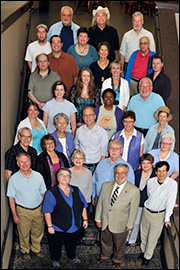Board of Trustees hears report on ‘fair share’ giving
Changes to Annual Program Fund and district fees mulled.
On June 19, the board sent back a Monitoring Report by the UUA administration and asked the administration to describe the metrics it uses to measure its compliance with board policies.
Trustee Donna Harrison, convener of the board’s Governance Working Group, explained that the working group had unanimously agreed that the administration’s Monitoring Report about Policy 2.14, which lays out requirements for the kinds of information the administration provides to the board, did not provide “operational definitions” and could not be evaluated meaningfully by the board. The board asked the administration to resubmit its report by the end of August.
Trustees also approved an amendment to Policy 2.13, which governs election practices.
On June 20, the board heard a presentation by UUA staff about the history and future of the Annual Program Fund (APF), the portion of the UUA’s budget contributed by its member congregations.
Since 1980, congregations have been asked to give a set amount per member to the UUA and another amount to the district to which the congregation belongs. In 1980, the “fair share” contribution to the UUA was set at $8 per certified member, said the Rev. Terry Sweetser, vice president for Stewardship and Development. Today it is $58 per certified member. Since 1997, congregations with more than 550 members have had the option of giving a set percentage of their budget, currently 4.2 percent.
Only about three-quarters of the UUA’s member congregations currently give at “fair share” levels, Sweetser and the other presenters said. Leaders of many congregations have complained about inequities in the rate of giving. The Rev. Dr. Terasa Cooley, director of Congregational Life, said district leaders also complained about different formulas for congregational contributions and widely divergent funding levels between districts.
“We’re going to move toward a percentage-of-budget ask” for the UUA from all congregations, Cooley told the board, although she did not present a timeline. (Changes to the APF formula require approval by the board.) She added that many congregational and district leaders also favored a “unified ask”—a single contribution rather than separate contributions to districts and to the UUA. Longstanding differences in the ways individual districts are funded and the current move toward sharing staff across districts in multi-district regions would make a unified ask impossible right now, Cooley said, but in a poll conducted by the UU Ministers Association 70 percent of ministers said they wanted to move toward a unified ask, she said.
Cooley told the board that a staff team assigned to study the Annual Program Fund this past year had concluded, “We want people to feel greater sense of identity, a greater sense of belonging to our faith. We want to instill a sense of mutual accountability. We want people to understand that if they can’t give, someone else has to carry that weight. We want them to ask, ‘What is my accountability?’”
She asked the board to consider what it means for UU congregations to be in covenant with each other, and what the financial implications might be.
In the two-hour board conversation that followed, Moderator Gini Courter observed, “Covenant is not a service. It’s about who we are and who we want to be. We, the board, need to understand that it’s impossible for the covenant question to happen if the board doesn’t lead it.”
On Monday, June 25, following the close of General Assembly, the board met to discuss GA and upcoming board business. Board members were abuzz with the just-released U.S. Supreme Court ruling on SB 1070, and two lawyers on the board, Nancy Bartlett and the Rev. Catherine Cullen, briefed the board on the ruling. “It is really a victory for us,” Cullen said. Even though the “show your papers” provision was upheld, she noted that the court indicated it would likely review that provision with more specific facts.
The board took just one vote on June 25, approving changes to the Monitoring Report schedule, and welcoming the new youth observer, Katherine Allen of Unity Church-Unitarian in St. Paul, Minn.
The board also named a group of people to suggest a process for identifying the qualifications they’ll seek in the four trustees who will be appointed to two-year terms when the board downsizes from 23 to 14 members in June 2014.
The board also indicated that it plans to review the Fifth Principle Task Force report (pdf) on reforming UUA governance and the General Assembly at an upcoming meeting.
Michelle Bates Deakin contributed reporting to this story. An abridged version of this article appeared in the Fall 2012 issue of UU World (“Board hears ‘fair share’ giving report,” page 43). See sidebar for links to related resources.
Comments powered by Disqus







